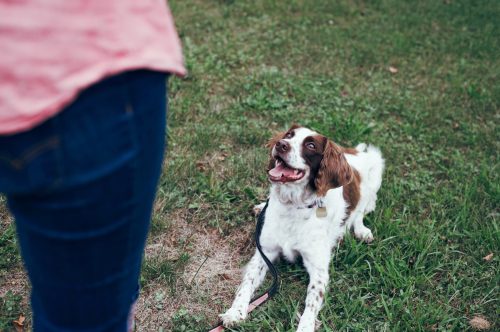Are you interested in training your dog, but don’t know where to start? Seeking out a professional dog trainer is a great way to tackle all of your dog training goals effectively, and without feeling so alone in the process.
To choose the best training plan for your pup, consider their behavior and age, as well as your lifestyle and training goals. One of the most important choices you’ll make is whether you want to do group versus private training lessons. If you’re not sure which would be best, here’s some of the common benefits and drawbacks of group classes and private training to help you decide.
Group Training
Right off the bat, group training is generally more affordable, more social, and better for overall basic training. If you have a puppy at home and would like to teach them behavioral skills, group training allows them to better master their skillset due to being in a busy social setting. By getting the opportunity to gain confidence around other dogs, you can guarantee that your pup is properly socialized. Then, when you venture out for dog walking in Columbus, Ohio, you won’t have to worry about your pup not obeying your commands despite the stimuli in their surroundings.
Group training is also great for pet parents who are seeking to be a part of a supportive community. Many will have similar concerns and needs for their pups. Training with a group can foster a friendly and energetic environment, encouraging dogs and pet parents alike to work harder to succeed in the class. Pet parents can get together to talk about wins and losses, share their insights with one another, and foster collaborative and deep connections. To top it off, this could lead to new friendships (for both dog and human!) and therefore a full calendar of puppy play dates. Plus, doing different pup activities can be so much more fun when your pup has other furry friends to join them!
The Drawbacks of Group Training
While group classes have many benefits, they aren’t ideal for every dog. Those with severe and/or pre-existing behavioral, anger, or anxiety issues might be deemed unsafe in group settings. Under these conditions, a pup would fare much better with a private dog trainer. In a group class, the trainer often has to divide their focus between all the pups present. This renders the trainer incapable of providing individualized attention and care, which is crucial for a dog who has more serious behavioral concerns.
Private Training
Private dog training is ideal for clients with busy schedules who have specific training goals in mind or an adult dog who will benefit from a quieter learning environment. Private sessions ensure that all of the focus is on you and your pup. Every session is geared toward specific client goals, making this type of training ideal for dogs with anxiety, aggression, or any other specific behavioral issue. Private sessions are often better for older dogs than group sessions, as the quiet training environment helps them to focus better. Private training is typically designed to suit your specific needs, making it ideal for pet parents with chaotic schedules that can’t commit to a set time every week or would prefer in-home dog training. If you are interested in strengthening your bond one on one with your pup in a quiet, personalized environment, private training is for you!
Private training comes with a ton of perks, but it isn’t ideal for everyone. Because the lessons are so personalized and offer undivided attention from the trainer, private lessons are typically more expensive than group lessons. Private lessons also lack the social aspect that group lessons offer. While this may be exactly what your dog needs to promote their training, some owners find that they desire the support system and sense of community that group lessons offer.
Or use both environments to your advantage!
Some pups (and owners) will benefit from both types of training! Oftentimes, a dog will start out taking private lessons in order to build up a solid foundation of obedience and to eliminate any specific behavioral issues they have such as anger or anxiety. Once the foundational training has been established, pups and their parents can continue training in group classes in order to improve command reliability or to develop specialty skills.
Semi-private lessons with 3-4 other dogs are typically the most effective way to work on specific skills without losing out on the community aspect of training. The training is still very much geared towards your pup, and the trainer can offer individualized attention to each participant, but the pup and the owner do not completely lose out on the social aspect of training, either.
What should I do if I’m unsure of my training goals?
It is completely normal to be confused about what specific skills you and your pup need to work on. Sometimes we know that we need to work on obedience training, but aren’t sure where to start or what a good end goal looks like. This is why it is important to choose a trainer that will help you through this process and advise you on how to establish a productive and efficient training plan for your specific situation. Sometimes trainers can offer creative training solutions to solve problems, curb behaviors that we didn’t know were unhealthy, and even help your pup make a PAWsitive influence in their community!
Conclusion
Regardless of how you choose to train your fur baby, it’s always a good idea to talk with your trainer about your goals and what training methods will work best for you and your pup. A comfortable environment is always the first step in strengthening your relationship and building up those training skills!















